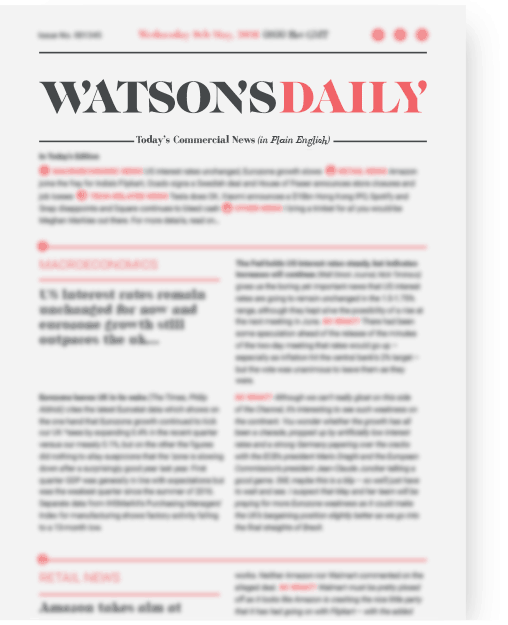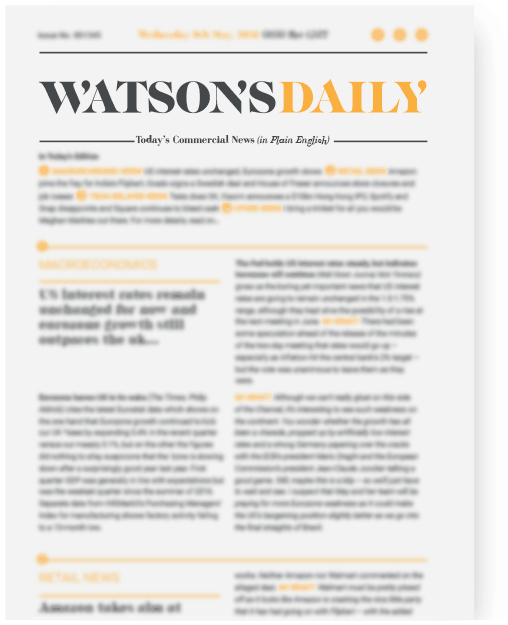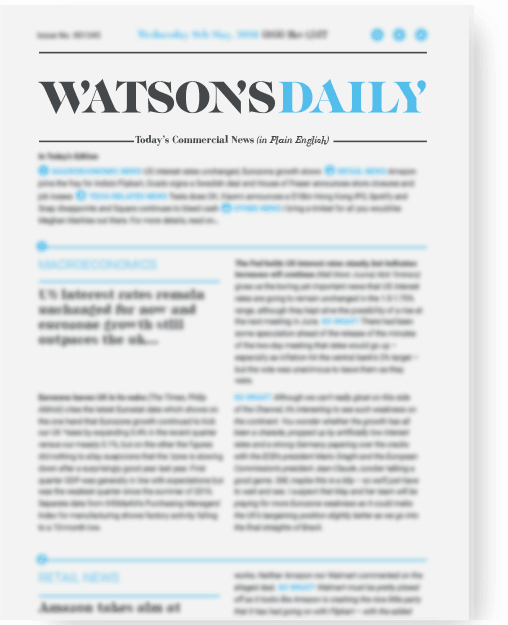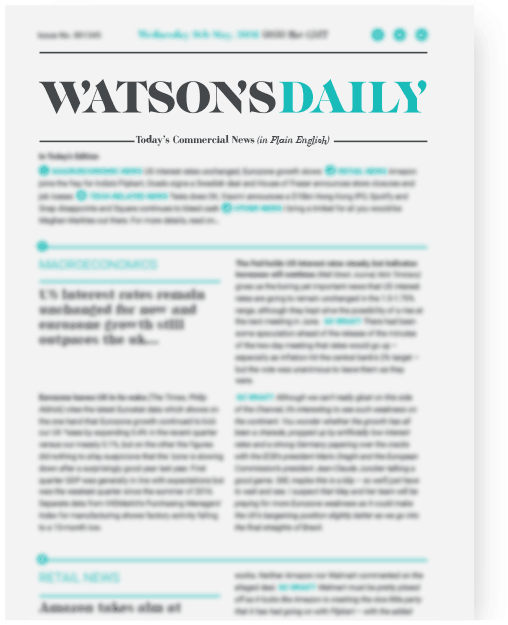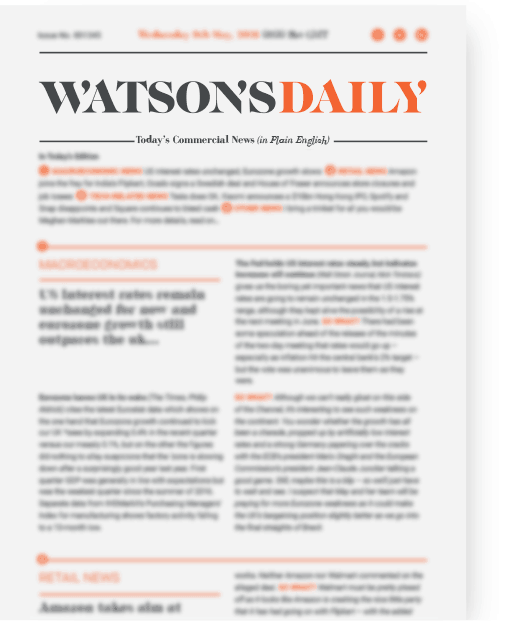- In MACRO NEWS, the Brexit drama rumbles on while UK productivity worsens
- In TELECOMS NEWS, Arqiva makes a £2bn sale and Vodafone axes 1,000 stores
- In TECH NEWS, Samsung beats forecasts while Tesla/Panasonic relations get strained on batteries
- In INDIVIDUAL COMPANY NEWS, pilots sue Boeing, Domino’s suffers, recruiter profit warnings reflect uncertainty and M&S sees new management for its food division
- In OTHER NEWS, I bring you (possibly) my new favourite band…
1
MACRO NEWS
So BoJo battles on while tariff talk causes a stir and UK productivity hits 5-year lows…
Brussels plays for time as UK goes on the attack (Financial Times, Sam Fleming and Guy Chazan) looks at what might happen in the event of another extension to the Brexit deadline as it is looking increasingly like current talks are about to fail. The EU doesn’t want to be blamed for being the cause of the breakdown and some officials see value in keeping the option of an extension open beyond October 31st or until after a UK election. The UK side has become notably more hostile in tone in the last 24 hours as Germany’s Angela Merkel was blamed by BoJo for torpedoing any possibility of reconciliation following a phone call where the German Chancellor objected to his proposal to exclude Northern Ireland in a customs union with the bloc. However, the Germans say that he was misrepresenting the contents of the phone call as part of a blame game. The drama continues ahead of talks scheduled for next week.
In the meantime, UK plans low-tariff regime in a no-deal Brexit (Financial Times, George Parker) highlights a proposed temporary tariff regime that was announced yesterday for a no-deal Brexit scenario whereby 88% of imports would be tax-free. * SO WHAT? * The Treasury has
wanted to keep import taxes low in a no-deal exit in order to head off a potentially massive sudden rise in inflation. Such proposals obviously aren’t good for everyone and representatives from the farming and ceramics sectors in particular objected that this would be unfair given that their own exports into the EU would be hit by new higher tariffs while imports would benefit hugely from the lack of taxes. The National Farmers’ Union said the new proposals would give “zero protection against cheap imports coming in from around the world”. Whatever is negotiated, there are always going to be some losers and they will, quite rightly, complain loudly.
Productivity falls at fastest rate since 2014 as Brexit hits investment (The Guardian, Richard Partington) cites the latest data from the Office for National Statistics which shows that labour productivity – which measures economic output per hour of work – fell by 0.5% in the three months to June versus the same period a year ago, making it the worst performance since the middle of 2014. * SO WHAT? * Many economists believe that improvement in productivity is key to boosting economic growth and improving living standards and BoJo himself said last week in the Conservative Party Conference that “With infrastructure, education and technology we will drive up the productivity of this country and bring it together”. Many say that without investment and improvement in productivity, the economy is likely to continue to slow down – and this has been made worse by Brexit uncertainties.
2
TELECOMS NEWS
Arqiva sells its telco division to Cellnex for £2bn and Vodafone cuts store numbers…
Arqiva sells telecoms division to Spanish giant for £2bn (The Times, Arthi Nachiappan) heralds a deal that will make Barcelona-based Cellnex the biggest independent operator of wireless infrastructure in Britain as it bought 7,400 mobile towers and the rights to market another 900 sites in the UK, allowing Arqiva to focus on its broadcasting mast business. Cellnex Telecom is Europe’s largest independent operator of wireless infrastructure and the deal is expected to complete in the second half of 2020. * SO WHAT? * This is just the latest in a string of acquisitions by Cellnex, which recently bought the marketing and operational rights for 220 high towers from BT, the broadband provider, in June. Arqiva will be using most of the proceeds from the sale to pay down debt.
Vodafone shuts 1,000 stores in Europe as focus shifts to online (The Times, Alex Ralph) heralds moves by the company to address the rise of online shopping and the industry’s rather ropey record on customer satisfaction by revamping 40% of its 7,700 European shops by the end of the next financial year and closing 15%. Although this move was not billed as part of cost-cutting efforts, Vodafone is trying to cut operating expenses to the tune of €1.2bn within three years as it faces debts of around €47bn. The company plans to introduce more “experiences” in stores, more convenience outlets and kiosks as well as click-and-collect services. A spokesman said that closures weren’t expected in the UK, but didn’t really shed much light on where they would fall. * SO WHAT? * Interestingly, Vodafone has actually been INCREASING the number of outlets in the UK – and plans another 24 this year and 50 next – while competitors such as O2 and EE have been reducing theirs, according to the Local Data Company. Vodafone is not known for excellence in its customer service and so it’s good to see that it is taking measures to address this given that it’s a competitive market out there!
3
TECH NEWS
Samsung beats forecasts with 56% fall in operating profit (Financial Times, Song Jung-a) shows that third quarter profits fell for the fourth quarter in a row due to weak memory chip prices but not quite as badly as everyone was expecting. OK, so operating profit fell by a chunky 56% in the July-September period versus a year ago but analysts are now saying that things may be bottoming out now and pointed to company guidance of a 16.7% quarter-on-quarter hike in operating profit expectations. Samsung’s mobile business also benefited from US sanctions against Huawei, its display business improved following the launch of Apple’s new iPhone last month and its new Galaxy Note 10 with 5G capability is currently outselling its predecessor.* SO WHAT? * Given that the company generates over 50% of its operating profit from semiconductors, the prospect of seeing light at the end of the tunnel is an important development. Mind you, given that US rival Micron Technology painted a bleak outlook for the industry as recently as last month you do hope that analysts aren’t getting ahead of themselves as consensus would suggest that chip prices aren’t likely to make a full recovery until next year due to the global economic
slowdown and the US-China trade war. The other potential cloud on the horizon is the ongoing spat with Japan, which has led to a restriction in the supply of key chemicals needed by the South Korean chipmakers.
Tesla needs its battery maker. A culture clash threatens their relationship (Wall Street Journal, Tim Higgins and Takashi Mochizuki) is a really interesting article that suggests a widening gap between Elon Musk’s freewheeling ways and the Japanese company’s inherent conservative nature is being made worse by the underwhelming nature of its Gigafactory joint venture. It was supposed to boost profits and assure Panasonic’s place in the future of automotive electronics while giving Tesla a steady supply of its most expensive and important components – its batteries. Both sides are arguing about the handling of battery production as Tesla has continued to pressure Panasonic on the price of its battery cells, which is one of the reasons why Panasonic’s share price has fallen by almost 50% since the start of last year. Pressure from Tesla is unlikely to abate given that it will have to continue to improve efficiency and cut manufacturing costs to keep the sticker price of its cars competitive. Conclusion: both parties need the venture to work, but cultural differences and increasing resistance from within Panasonic itself are making this harder by the day. If you want to get a good potted history of how the relationship has developed between these two companies, I would highly recommend that you read this article.
4
INDIVIDUAL COMPANY NEWS
Boeing pilots kick up a fuss, Dominos suffers, recruiters paint a stark picture and M&S gets new senior management on food…
The bad news keeps on coming in Pilots sue Boeing after losing pay from grounding of aircraft (Daily Telegraph, Oliver Gill) as pilots at Southwest Airlines are now suing the aircraft maker for leaving them $100m out of pocket due to the grounding of its 737 Max planes. The pilot’s union says that its members agreed to fly the plane “based on Boeing’s representations that it was airworthy” but alleged that “these representations were false”. * SO WHAT? * This will be the first case of its kind – and I am sure other airline pilots around the world will be watching developments very closely. Rather unsurprisingly, Boeing came out fighting saying that “We believe this lawsuit is meritless and will vigorously defend against it. We will continue to work with Southwest Airlines and its pilots on efforts to safely return the Max to service”. If the pilots win, Boeing’s losses could get a whole lot bigger as other pilots elsewhere follow suit.
Following on from yesterday’s disappointing news at Pizza Express, Domino’s Pizza tempers sales outlook as delivery battle heats up (Wall Street Journal, Heather Haddon and Micah Maidenburg) shows that the world’s biggest pizza
company by sales said that its sales growth over the next few years would be slower than anticipated due to increased competition from food delivery companies. However, pizza fans should take heart from Domino’s Pizza: wheel of fortune (Financial Times, Lex) which says that the company is right to keep control of its own delivery capability as commissions at third-party delivery companies continues to rise and that its ability to generate healthy cash flow will pull it through.
Recruiters’ profits hit by global uncertainty (The Times, Elizabeth Burden) highlights profit warnings from two of the UK’s leading recruitment agencies – Page Group and Robert Walters – as global economic uncertainty filters through to staff recruitment. PageGroup/recruitment: Brexit wrecks it (Financial Times, Lex) highlights the plight of recruitment firms as leading indicators of the economy but makes the point that their share prices can recover quite quickly. Obviously, we don’t know what the ultimate effect of Brexit may be but Lex seems to be fairly calm about the prospects for these diversified recruiters.
Then in Four new faces tuck into M&S food (The Times, Ashley Armstrong) we see that four new directors have been brought into the ailing high street retailer to turn around the performance of its food business ahead of its tie-up with Ocado. It’s good to see news that senior bods are coming in to the firm as it seems that most senior management have been heading to the exit of late…
5
OTHER NEWS
And finally, in other news…
Today, I thought I’d highlight a band that popped up on my YouTube feed over the weekend. You may well think I’m a bit slow to the party, but Pomplamoose make some great songs and really clever mash-ups like this: https://www.youtube.com/watch?v=hmLBSCiEoas . Very clever!
Some of today’s market, commodity & currency moves (as at 0903hrs green is up, red is down). THIS IS INTENDED AS A ROUGH GUIDE ONLY!
| FTSE 100 * | Dow Jones * | S&P 500 * | Nasdaq** | DAX * | CAC-40 * | Nikkei ** | Shanghai ** |
| 7,143 (-0.76%) | 26,164 (-1.19%) | 2,893 (-1.56%) | 7,824 | 11,970 (-1.05%) | 5,457 (-1.18%) | 21,456 (-0.61%) | 2,925 (+0.39%) |
| Oil (WTI) p/b | Oil (Brent) p/b | Gold Per t/oz | £/$ | €/$ | $/¥ | £/€ | $/₿ |
| $52.6329 | $58.1828 | $1,506.32 | 1.22281 | 1.09815 | 107.23 | 1.1135 | 8,176.71 |
(markets with an * are at yesterday’s close, ** are at today’s close)





